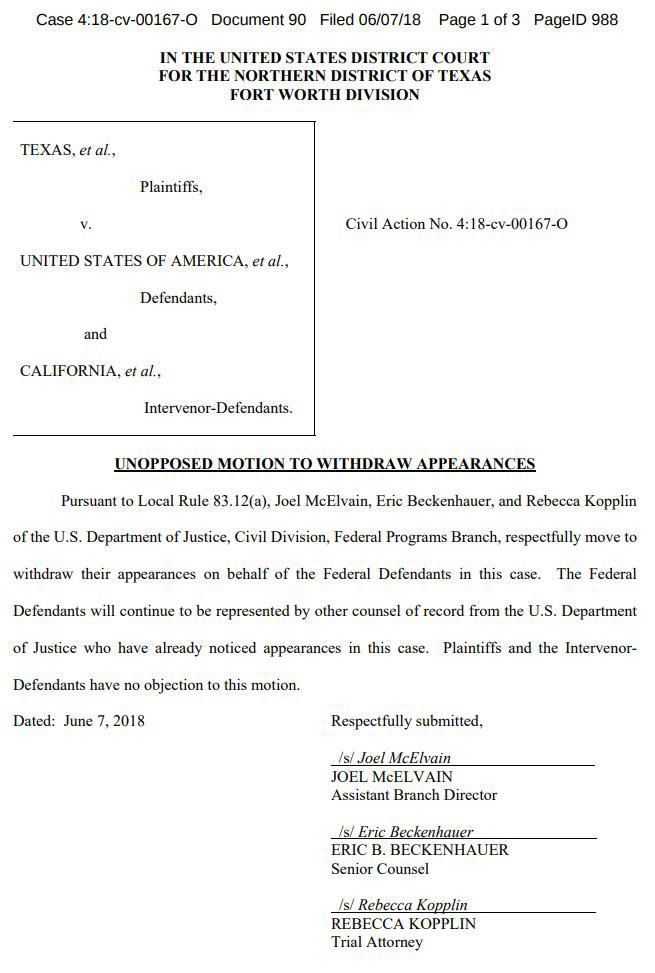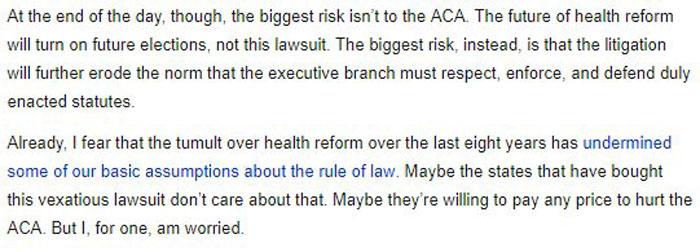TEXAS FOLD'EM:* ACA about to be torpedoed by a lawsuit even more idiotic than King vs. Burwell???
(*credit to Nicholas Bagley for coining "Texas Fold'em")
Ut-oh. I've only written one blog post about this one (back in February) because the argument behind it is so idiotic that it actually makes King vs. Burwell seem like Marbury v. Madison by comparison.
Here's the short version:
Texas is suing the federal government over President Barack Obama's landmark health law — again.
In a 20-state lawsuit filed Monday in federal court, Attorney General Ken Paxton argued that after the passage of the GOP's tax plan last year — which also repealed a provision of the sweeping legislation known as "Obamacare" that required people to have health insurance — the health law is no longer constitutional.
“Texans have known all along that Obamacare is unlawful, and a divided Supreme Court’s approval rested solely on the flimsy support of Congress’ authority to tax. Congress has now kicked that flimsy support from beneath the law,” Paxton said in a statement Monday. “With no remaining legitimate basis for the law, it is time that Americans are finally free from the stranglehold of Obamacare, once and for all.”
Here's the simplest possible summary of the argument that Paxton et al are trying to make:
- The ACA is only Constitutional because the Individual Mandate Penalty was declared to be a tax.
- The Individual Mandate Penalty no longer exists.
- Therefore, the entire ACA is no longer Constitutional.
That's pretty much it in a nutshell. Seriously.
As I noted at the time:
Here's the actual lawsuit text...and the chutzpah of the premise is breathtaking:
The Patient Protection and Affordable Care Act (the “Affordable Care Act,” “the ACA” or “the Act”), as recently amended, forces an unconstitutional and irrational regime onto the States and their citizens. Because this recent amendment renders legally impossible the Supreme Court’s prior savings construction of the Affordable Care Act’s core provision—the individual mandate—the Court should hold that the ACA is unlawful and enjoin its operation.
...On December 22, 2017, the President signed into law the Tax Cuts and Jobs Act of 2017. This new legislation eliminated the tax penalty of the ACA, without eliminating the mandate itself. What remains, then, is the individual mandate, without any accompanying exercise of Congress’s taxing power, which the Supreme Court already held that Congress has no authority to enact. Not only is the individual mandate now unlawful, but this core provision is not severable from the rest of the ACA—as four Justices of the Supreme Court already concluded. In fact, Congress stated in the legislative text that the ACA does not function without the individual mandate.
Yep, their entire argument is literally "because we sabotaged one part of Obamacare, it means that there's no choice but to tear down the rest of it as well, gosh darn it!"
In fact, they actually use the fact that the mandate itself is still technically on the books as the basis for this argument, which seems nuts to anyone who isn't a Constitutional lawyer, but could very well make "sense" due to the cryptic way in which such things are interpreted by judges.
Of course, once again, Congress does still have "taxing power"...they simply chose (well, the Republicans did, anyway) to weaken their implementation of it.
Here's law professor and ACA expert Nicholas Bagley with the skinny:
I bring all this up because of the pending litigation from a consortium of states seeking, yet again, to invalidate the Affordable Care Act. The two individual plaintiffs that they’ve enlisted to support their standing have submitted affidavits saying that they’re healthy, self-employed, and earn more than 400% of the poverty line.
Accepting those claims as true, the two plaintiffs have sustained a pocketbook injury on account of the ACA. That’s because the ACA requires insurance sold on the individual market to be made available to the poor and the sick alike on equal terms. If a court declared the ACA unconstitutional, these two plaintiffs could probably buy comparable, risk-rated insurance for much less.
But their specific legal argument isn’t about the ACA as a whole. Rather, the plaintiffs believe that the individual mandate is unconstitutional because (a) the Supreme Court only upheld the mandate as an exercise of Congress’s taxing power, (b) the tax penalty has now been repealed, and (c) the penalty-free “mandate” that’s now on the books is unconstitutional. Then—and here’s the kicker—the plaintiffs argue that the individual mandate can’t be severed from the rest of the ACA, meaning that the entire statute has to be wiped from the books.
That’s analogous to saying that the invalidity of the $3 checkbox should render the entire Internal Revenue Code unconstitutional. It’s a laughable argument, but that’s the claim. (The plaintiffs insist that this penalty-free mandate causes them injury because “I value compliance with my legal obligations, and believe that following the law is the right thing to do.” That’s garbage: the Supreme Court has already held that they have no legal obligation to buy insurance. The plaintiffs’ injury arises from ACA writ large, not from the mandate.)
So what’s a court to do? A court could assume the validity of the plaintiffs’ argument about the invalidity of the entire ACA, as silly as that argument is, and say that they have standing. But the court would then risk issuing an advisory opinion about the constitutionality of the individual mandate. Alternatively, a court could deny plaintiffs’ standing by rejecting their remedial argument, at the risk of issuing an advisory opinion about severability. Either way, the court would be violating Article III. Right?
I’ve got a couple of thoughts about how to square this particular circle in the coming days. But I think it’s a genuine puzzle, and not one with a tidy answer.
OK, so it's an absolutely insanely terrible legal case...but it still has to be defended against.
And guess who gets to defend against the lawsuit? The U.S. Department of Justice.
Donald Trump's U.S. Department of Justice.
Well, guess what just happened moments ago?
Guys, I have a very bad feeling about this. These are the civil servant line attorneys withdrawing from the Texas lawsuit minutes before the USG's brief is due to be filed.
— Nicholas Bagley (@nicholas_bagley) June 7, 2018
In short: This makes it look very much like Trump's DoJ is basically throwing the fight.
Maybe it's nothing. Maybe it's nothing. Maybe it's nothing. Maybe it's nothing. Maybe it's nothing. Maybe it's nothing. Maybe it's nothing. Maybe it's nothing. Maybe it's nothing. Maybe it's nothing. Maybe it's nothing. Maybe it's nothing. Maybe it's nothing. Maybe it's nothing. https://t.co/vFGPVbD9Bk
— Nicholas Bagley (@nicholas_bagley) June 7, 2018
I stand by this. We'll see what the Justice Department says when it files its brief. https://t.co/Am5V5f8OHt pic.twitter.com/g8sMHIqzih
— Nicholas Bagley (@nicholas_bagley) June 7, 2018
Forget the canary--this is more like the shrieking hyena in the coal mine. Respected career lawyers. Trump DOJ perhaps about to argue that ACA is 100% invalid.https://t.co/ZSXKx6wuH4@nicholas_bagley @ShallTakeCare
— Marty Lederman (@marty_lederman) June 7, 2018
UPDATE: NARRATOR: It wasn't nothing.
(instead of embedding the actual tweets, which takes a long time, I'm just gonna copy and paste the text from Nicholas Bagley's thread):
- Here's the brief. As expected. The Justice Department believes the crucial insurance reforms of the Affordable Care Act are unconstitutional and will not defend them. This is an enormous blow to the integrity of DOJ.
- The Justice Department doesn't think an injunction is immediately warranted. But on no uncertain terms, it argues that the federal courts should invalidate the crucial operative provisions of the ACA.
- I am at a loss for words to explain how big of a deal this is. The Justice Department has a durable, longstanding, bipartisan commitment to defending the law when non-frivolous arguments can be made in its defense. This brief torches that commitment.
- Pick your adjective. The arguments that the plaintiffs have offered in favor of their argument that the penalty-free mandate requires striking down the whole statute are silly. Laughable. Ridiculous. Unprincipled. And yet --
- To be clear, the ACA remains intact, and will remain intact for the foreseeable future. This case is not going anywhere fast, and the likelihood that the Supreme Court endorses this travesty of an argument is slim.
- But the blow to the institutional integrity of the Justice Department is profound. That's why three line attorneys -- civil servants who have made arguments they disagreed with countless times -- removed themselves from this case. These arguments are that far beyond the pale.
- If you want a somewhat longer primer on what's happening here, I wrote about the risk of the Trump administration's cravenness back when the case was first filed. But even I didn't think the administration was THAT unprincipled.
- Do you want to live in a country where the executive branch can pick and choose the craziest of arguments and decline to defend -- or even to enforce! -- laws on that basis? The President has a duty to take care that all the laws are enforced, not just the ones he agrees with.
- I don't mean to be an alarmist about the rule of law, but now is a time for being an alarmist about the rule of law. The Trump administration has just announced that it doesn't care that the law was passed by Congress and signed into law by the President.
- It dislikes the law, and can muster the stupidest of fig-leaf arguments to claim that its essential elements should be invalidated. If this stands as a precedent, the rule of law will mean one thing in a Republican administration and a different one in a Dem administration.
- By the way, the administration invites the court to enjoin the preexisting condition rules on January 1, 2019. And they've pulled a right-wing judge to rule on the case. Good luck with getting insurers to enroll under a cloud of uncertainty like that.
Larry Levitt of the Kaiser Family Foundation has a slightly less horrific take regarding the 2019 Open Enrollment Period, anyway:
The Justice Department's brief creates another cloud of uncertainty for insurers, just as they're filing proposed ACA rates for 2019. When insurance companies face uncertainty, they increase premiums.
— Larry Levitt (@larry_levitt) June 8, 2018
This ACA legal case will likely not be decided soon, so I wouldn't expect insurers to drop out of the market. Ultimately, either the ACA will remain intact. Or, it will get blown up by the courts, at which point insurers and regulators will have to start from scratch.
— Larry Levitt (@larry_levitt) June 8, 2018
27% of non-elderly adults have pre-existing conditions. Arguing in court that protections for them should be eliminated, as the Trump administration is now doing, could provoke a backlash in an election year.https://t.co/3rUghb9FF5
— Larry Levitt (@larry_levitt) June 8, 2018
Repealing the ACA's individual mandate penalty poses trade-offs, but no doubt was a popular move. Ending protections for people with pre-existing conditions, as the Trump administration is now arguing, would be quite the opposite.
— Larry Levitt (@larry_levitt) June 8, 2018
How to support my healthcare wonkery:
1. Donate via ActBlue or PayPal
2. Subscribe via Substack.
3. Subscribe via Patreon.





